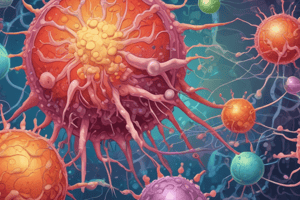Podcast
Questions and Answers
If a patient's bone marrow is damaged, which of the following immune functions would be most directly affected?
If a patient's bone marrow is damaged, which of the following immune functions would be most directly affected?
- Antibody production by plasma cells. (correct)
- Activation of cytotoxic T cells in the thymus.
- Oxygen transport by red blood cells.
- Phagocytosis of microorganisms by neutrophils.
A researcher is studying the differentiation of immune cells. Which cell type would they expect to find undergoing maturation within the thymus?
A researcher is studying the differentiation of immune cells. Which cell type would they expect to find undergoing maturation within the thymus?
- Immature lymphocytes becoming mature T cells. (correct)
- B cells developing into plasma cells.
- Hematopoietic stem cells differentiating into neutrophils.
- Monocytes transforming into macrophages.
A patient is diagnosed with a viral infection. Which type of immune cell would be primarily responsible for directly killing the infected cells?
A patient is diagnosed with a viral infection. Which type of immune cell would be primarily responsible for directly killing the infected cells?
- B cells
- Helper T cells
- Cytotoxic T cells (correct)
- Plasma cells
Which of the following best describes the role of helper T cells in the immune response?
Which of the following best describes the role of helper T cells in the immune response?
A vaccine works by stimulating the production of which of the following?
A vaccine works by stimulating the production of which of the following?
Which of the following cell types is primarily involved in phagocytosis?
Which of the following cell types is primarily involved in phagocytosis?
Monocytes in the bloodstream will differentiate into which type of cell when they migrate into tissues?
Monocytes in the bloodstream will differentiate into which type of cell when they migrate into tissues?
Which of the following blood components is NOT directly involved in the immune response?
Which of the following blood components is NOT directly involved in the immune response?
Which cell type is responsible for presenting antigens to T cells, initiating an adaptive immune response?
Which cell type is responsible for presenting antigens to T cells, initiating an adaptive immune response?
How do immunoglobulins combat foreign antigens?
How do immunoglobulins combat foreign antigens?
Flashcards
Bone marrow
Bone marrow
Site in the body where most immune system cells develop from hematopoietic stem cells.
Stem cells
Stem cells
Cells with the potential to develop into different immune system cells.
Thymus
Thymus
Organ in the chest that instructs immature lymphocytes to become mature T cells.
B Cells
B Cells
Signup and view all the flashcards
Cytotoxic T cells
Cytotoxic T cells
Signup and view all the flashcards
Helper T cells
Helper T cells
Signup and view all the flashcards
Plasma Cells
Plasma Cells
Signup and view all the flashcards
Immunoglobulins (antibodies)
Immunoglobulins (antibodies)
Signup and view all the flashcards
Neutrophils
Neutrophils
Signup and view all the flashcards
Monocytes
Monocytes
Signup and view all the flashcards
Study Notes
- Bone marrow is where most immune system cells develop from hematopoietic stem cells.
- Stem cells can develop into the different cells of the immune system.
- The thymus is an organ in the chest that matures immature lymphocytes into T cells.
- B cells arise in bone marrow and become plasma cells, which produce immunoglobulins (antibodies).
- Cytotoxic T cells mature in the thymus and kill virus-infected cells.
- Helper T cells help other T cells and B cells function.
- Plasma cells develop from B cells and create immunoglobulins (antibodies).
- Immunoglobulins (antibodies) are specialized proteins that fit foreign antigens.
- They can match almost all possible microorganisms.
- Neutrophils, also known as polymorphonuclear (PMN) cells, are white blood cells that ingest and kill microorganisms through phagocytosis.
- Monocytes are white blood cells in the bloodstream that become macrophages in tissues.
- Macrophages ingest and kill germs via phagocytosis.
- Red blood cells carry oxygen from the lungs to the tissues.
- Platelets are small cells important for blood clotting.
- Dendritic cells instruct T cells on what to attack and are also known as antigen-presenting cells.
Studying That Suits You
Use AI to generate personalized quizzes and flashcards to suit your learning preferences.




